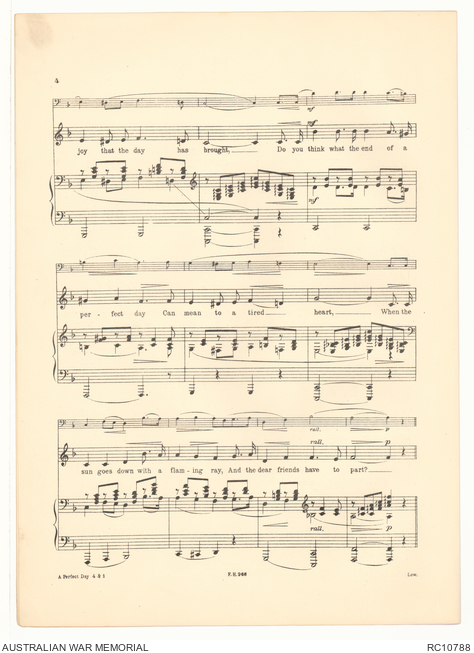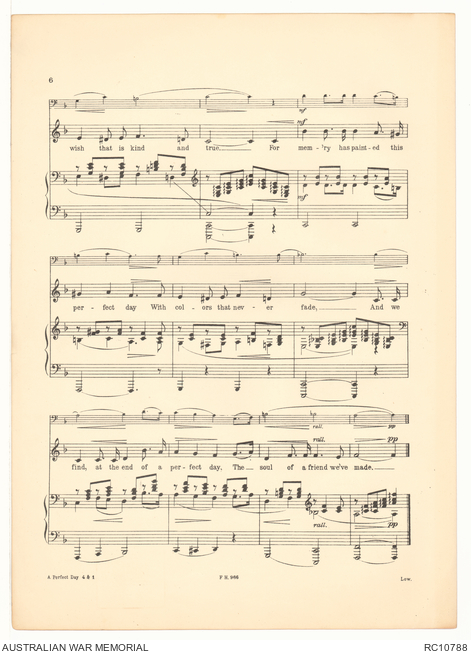| Accession Number | RC10788 |
|---|---|
| Collection number | Sheet Music Collection 303 |
| Collection type | Published Collection |
| Record type | Item |
| Item count | 1 |
| Measurement | Overall: 35 cm x 26 cm |
| Object type | Sheet Music |
| Maker |
Jacobs-Bond, Carrie |
| Place made | United States of America |
| Date made | c 1910 |
| Conflict |
First World War, 1914-1918 |
| Copying Provisions | Copyright restrictions apply. Only personal, non-commercial, research and study use permitted. Permission of copyright holder required for any commercial use and/or reproduction. |
[Sheet music] A perfect day








Sheet music for the song titled 'A Perfect Day', with lyrics and music written by Carrie Jacobs-Bond. This parlour song was written in 1909 after Jacobs-Bond watched the sun set over Mount Rubidoux while she was visiting friends in southern California, and was originally published in 1910. The lyrics of this song relate sitting alone with your thoughts as the sun sets, reflecting back on the joys of the day and saying farewell to friends.
The Daily Mercury (Mackay, QLD) detailed the story behind the song by Jacobs-Bond whilst she was visiting London in 1922; 'We had been watching the sun set from a beautiful hill in California…and I went home to get dressed for a dinner. While I was trying to dress, I wrote the words on a card.' Other reports of the story behind this song, such as one published in The Queensland Times (Ipswich) on 2 April 1924, reported that she had spent the day sightseeing, 'and as she was dressing for dinner she paused to stand at the window and watch the daylight fade into night. With a sigh of happiness, she reportedly said "It had been a perfect day." Acting on impulse, she commenced to write, and in the intervals of dressing she set down two stanzas. This article goes on to note she shared the verses with her friends before putting them away and forgetting about them. Three months later driving across the Mojave Desert one evening with friends 'the words came back to her mind, and she sang softly to a melody that seemed to come to her spontaneously. To her amazement she discovered she had written the most popular of modern songs.'
This copy of the sheet music was published about 1913. The cover has been divided into two frames with a maroon border. The top frame features a watercolour painting of pink roses with twilight associated colours extending across the page, with the artwork attributed to W. George. To the right of the roses, the first verse of the song has been typed and attributed to Carrie Jacobs-Bond, 1909. Underneath, in the second frame, are details about the song such as the title, composer, publishing details and pricing information. The song was published in London by The Frederick Harris Company and in Chicago by Carrie Jacobs-Bond & Son at the Bond Shop, and sold for 2 shillings or 60 cents. The second page of the sheet music features an advertising excerpt from the song 'God Remembers When the World Forgets', with words written by Clifton Bingham and music composed by Carrie Jacobs-Bond, first published in 1913. This is followed by a cello part for 'A Perfect Day' on page 3.
The back cover features a listing of works by Jacobs-Bond in the form of songbooks, individual pieces of sheet music and instrumentals. Five 'appreciations' about her music have also been included on the back cover with comments from Edith Brown Kirkwood; David Bispham; William H. Sherwood; David Frangcon Davies; and Jean De Reszke. According to Edith Brown Kirkwood, who published the following in The Chicago Tribune; 'Today Mrs. Carrie Jacobs-Bond is known as the writer of songs – words and music which have crept into the hearts of millions. Philosopher, painter, pianist, poetess, composer, interpreter, Mrs. Bond began the publication of her own productions, and from the Bond Shop in Chicago and the Office of Frederick Harris in London, there issues every year hundreds of thousands of her songs'.
Mr. Charles Cawthorne was the head of a well-known music company in Australia who specialised in the work of Jacobs-Bond. His review of 'A Perfect Day' in The Mail (Adelaide) on 26 October 1912, featured the first 10 bars of the song alongside his view of the piece 'The pretty thought expressed in the verse has been set to an attractive and tuneful melody by the composer of this song, which is uncommonly well presented, and will find many admirers.' The song did indeed find admirers, with The Sunday Times (Perth) edition of 15 December 1946 reporting that the song sold 6 million copies. More recently, a documentary titled Wisconsin Hometown Stories: Janesville claims a total of 25 million copies of the song have been sold since it was first released. In light of these sales, ‘A Perfect Day’ was regarded as 'the most popular song of the twentieth century' by The Advertiser (Adelaide) on 18 June 1938. As a result, the song was reported to have been a 'most consistent money-maker' by The News (Adelaide) on 9 December 1944, which noted that 'Although in any given year it would not sell as many copies as a popular hit, it has had a regular sale for over 25 years.'
Born Carrie Minetta Jacobs at Janesville, Wisconsin, USA, on 11 August 1861, Jacobs-Bond began submitting songs for publication following the sudden death of her husband, Dr. Frank Bond, in 1895. Suffering from rheumatism and facing increasing financial difficulties, the struggling widow reversed her fortunes to become the first female songwriter to make one million dollars from her music. In 1896 she opened Carrie Jacobs-Bond & Son, a publishing house in Chicago, so that she could publish her own music after repeated rejections from publishers. Mr. Frederick Harris, the London publisher of works by Jacob-Bond, described her as 'a versatile woman of middle age. She has a keen business instinct; she is a talented artist, and is able to design the title pages of all her songs as well as to supply the lyrics…'
The life of Jacobs-Bond and her immense success as a songwriter was the subject of many articles in Australian newspapers from the 1920s onwards. These articles often remarked upon the challenges she faced for the best part of a decade following the death of her husband, and how this period shaped her song writing. An article in The Queensland Times (Ipswich), 2 April 1924, suggested that songs like 'A Perfect Day' '…cannot be written by one who has skimmed through life lightly. They reveal evidence of sorrow and hardship and loneliness – all of which must be experienced for one to appreciate fully the healing happiness of a perfect day'.
Towards the bottom of this page is a sound recording of this sheet music, or a parody, that was created as part of the Music and the First World War project. More information about this recording, including names of the performers, can be found on the catalogue record for the sound recording. A link to the catalogue record for the sound recording can be found at the bottom of this page, under the heading ‘Related objects’ where it can be identified with the prefix [sound recording].
- Download PDF document of [Sheet music] A perfect day (file)
-
Listen to
[Sheet music] A perfect day
Related information
Subjects
People
Related Objects
- [Concert program] Item 9: The grand finale of the military concerts
- [Concert program] Item 16: Program of concert
- [Concert program] Item 2: Programme of concert
- [Concert program] Item 3: Grand concert
- [Concert program] Item 13: Grand concert
- [Concert program] Item 8: Xmas 1916 Field Bakeries North Rouen Sergeants' Mess
- [Concert program] Item 12: Band of H.M. Hampshire Regt.
- [Concert program] Item 15: Entertainment given by 'The Bluebells' under the direction of Miss Grace Harris
- [Concert program] Item 1: Patriotic League of Britons Overseas programme
- [Concert program] Item 13: 'The ANZAC Coves' Concert Party and the 27th Infantry Battalion Band